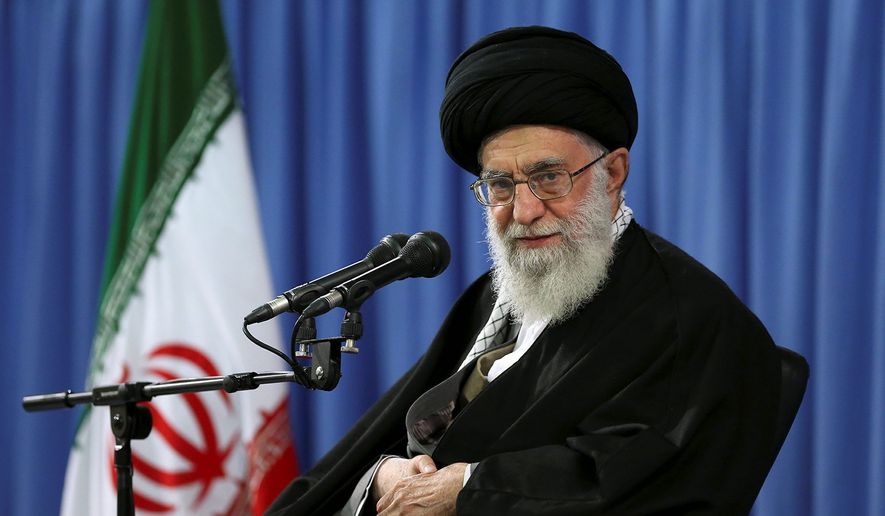President Obama isn’t the only leader having trouble and who could face a tough job selling the proposed nuclear deal with Iran.
Even if the U.S. and other world powers can settle on the delicate final terms of a nuclear deal with Tehran, there’s still a big chance Iranian hard-liners will pressure Supreme Leader Ayatollah Ali Khamenei to reject the accord.
Opposition from conservative factions is just as deep in Tehran as the resistance Mr. Obama faces in Washington, say analysts, who argue that the 75-year-old ayatollah’s hold on the situation is less secure than the U.S. media likes to portray.
“He’s the most powerful person, but he doesn’t exercise sole power over all decision-making, and I think he’s loath to alienate some of the main sources of his power,” said Robert Einhorn, a senior Brookings Institution fellow who served as a State Department Iran adviser until 2013.
Speculation over the inner workings of Iran’s faction-ridden power structure has swirled for years in Washington. But it reached new heights last week when the ayatollah, in his first public comments on the deal, accused the Obama administration of lying about what Iran has so far agreed to in the nuclear talks.
Ayatollah Khamenei, who said immediate sanctions relief should be at the center of any final deal, announced that he neither supports nor opposes the framework agreement announced by world powers in Switzerland this month, and is waiting to see what the final agreement contains.
SEE ALSO: Senators strike deal to force review of Obama-Iran nukes agreement
The bottom line, according to one former U.S. lawmaker who has spent time visiting with Iranian political and religious leaders on their own turf, is that the supreme leader himself is walking a tightrope between the elites, its hard-liners and Iran’s middle-class masses — who desperately long for an easing of international economic and travel sanctions.
“I don’t think there’s any question that Khamenei, as supreme leader, is shrewd enough to understand he has to balance these different constituencies,” said Jim Slattery, a former six-term congressman from Kansas who visited Tehran late last year through a Catholic University-backed effort known as the “Abrahamic Dialogue.”
Mr. Slattery, who slammed current U.S. leaders for ignoring the long and shifting history of American policy toward Tehran, said that it should be obvious that there are “powerful elements within Iran opposed to any rapprochement with the U.S.”
In an interview, he said three general groups carry more weight in the Majlis — Iran’s parliament — than do such moderate figures as President Hassan Rouhani and Foreign Minister Javad Zarif, the lead nuclear negotiator.
The first group consists of wealthy elites, who have actually benefited from Western sanctions by creating businesses that either elude the sanctions or deliver products without competition from imports.
“This includes elements of the business world that are producing military hardware and are enjoying a very profitable time right now, as well as other elements of the business community that want to keep sanctions in place so that they can raise prices on other commodities,” said Mr. Slattery. “The second group is the very fervent religious element that believes rapprochement with the West will threaten the underpinnings of Iran’s Islamic revolution.
“The third group is made up of what I call the Iranian nationalists,” he said. “These are the very hard-line Quds force types — the fervent nationalists, who will die to protect Iranian honor and are opposed to rapprochement because they believe it will threaten their Persian heritage and culture.”
“They are also deeply resentful of Israeli influence in the United States,” he said.
Jockeying for influence
What is unclear is which faction has the supreme leader’s ear. The opaque nature of Iran’s predominantly government-controlled media makes such influence even harder to gauge — a factor that has only been exacerbated by political tension around the nuclear talks.
The ayatollah’s speech last Thursday capped a week in which the state-controlled media offered conflicting signals on the depth of elite and popular support for the deal.
The official IRNA news agency reported that some 200 hard-liners staged an unauthorized protest against the deal in Tehran. But the report was soon eclipsed by headlines about how the chief commander of Iran’s Revolutionary Guard had publicly endorsed the deal. Other stories cited an IRNA poll showing some 96 percent of respondents supporting the Iranian negotiating team’s handling of the nuclear talks.
In cyberspace, photos and videos were posted of people dancing in the streets of Tehran to celebrate the deal.
Some analysts say the outpouring of support by average Iranians added a new element to the already-heated political fallout from the talks.
“Given the reaction in Iran to the tentative deal, I think it will be extremely difficult for Iran not to go forward and have the final deal,” Kenneth Katzman, a senior Middle East analyst with the Congressional Research Service, said during a panel discussion hosted in Washington last week by the National Council on U.S.-Arab Relations. “The repercussions in Iran would be tremendous if there were a collapse at the end of this.”
How Ayatollah Khamenei navigates the crosscurrents is an open question, Iran specialists say.
“My guess is that the supreme leader was concerned by this reaction for a number of reasons,” said Mr. Einhorn. “He might feel that he’s losing control of the situation and public opinion is getting way out ahead of him. He might also feel that these celebrations could undermine Iranian bargaining leverage at the negotiating table.”
Such logic may have been what prompted the ayatollah to embrace the guarded view of the talk last week — to show the U.S. and its allies that Iranian popular support for a deal does not mean Tehran will make concessions in the negotiations ahead.
“He may have been trying to strengthen Iran’s hand by playing much harder to get,” said Mr. Einhorn.
• Guy Taylor can be reached at gtaylor@washingtontimes.com.




Please read our comment policy before commenting.